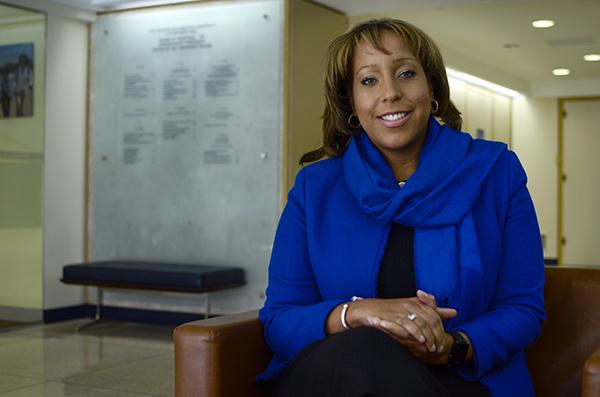GW’s head of human resources will leave next month to take a similar role at New York University and be closer to her family.
Vice President for Human Resources Sabrina Ellis made the announcement last week, after four years at GW. In her time at the University, she created a new benefits plan for faculty and staff, helped determine sexual assault policies and reorganized hierarchical structures after a series of layoffs.
Dale McLeod, the associate vice president for HR operations, will replace Ellis as interim vice president. Officials have not yet determined when they will begin a search for a permanent replacement.
Ellis said she is most proud of “expanding engagement” on conversations about faculty and staff benefits during her time at GW. She participated in a town hall last summer on the changes, which included anincrease in how much tuition staff have enrolled in degree programs must cover.
“I think the additional input of individuals across the University has been extremely helpful in helping to guide decision-making with University leadership,” she said.
Ellis said the move back to New York was “a unique opportunity to return to an institution where I have deep roots.”
“Being closer to family will be an added plus,” Ellis said in an email. “It has been rewarding working alongside faculty and staff and partnering with them on issues of broad institutional importance.”
Restructure in the offices
Following Ellis’s announcement, officials said they will restructure the finance and human resources offices, creating another layer of reporting and consolidating more responsibility under Deputy Executive Vice President and Treasurer Ann McCorvey.
McCorvey will now oversee human resources staff as well as the budget office. The Division of Operations – which includes facilities and construction – will report to long-serving Executive Vice President and Treasurer Lou Katz.
University spokesperson Maralee Csellar said these changes were made to ensure that officials were reporting their responsibilities to the appropriate people, improving efficiency and effectiveness.
“We are confident that these changes will allow us to continue to provide a high level of service and excellence to the University,” Csellar said in an email.
Csellar declined to say if there would be any additional hires or layoffs as a result of the changes.
Dave Lawlor, the former senior associate vice provost for finance, left in 2014 to accept a job as the chief financial officer at the University of California, Davis. Under Lawlor, six main departments divided responsibilities in the office. In 2015, those offices were consolidated to three units that reported to McCorvey.
At least eight staffers have left the finance office, according to an analysis of two organizational charts from 2014 and 2015. There are 10 vacancies in the office currently, according to a chart that was updated in December.
Csellar declined to comment on the vacancies within the office, including on how the responsibilities are now managed.
Joseph Cordes, a professor of economics, has worked with McCorvey as the chair of the Faculty Senate’s finance committee. He said giving new responsibility to McCorvey makes sense because many HR-related decisions have budget implications.
“She clearly, I think, plays a very important role in the day-to-day budgetary operations of the University,” Cordes said.
Cordes added that once permanent hires have filled current vacancies or positions held by interim staff, different perspectives could bring more change.
“I would not be surprised if we saw some changes as a result of different people now occupying those acting positions, and that could change the culture in certain ways,” Cordes said.







